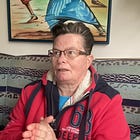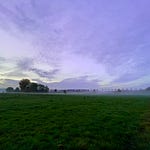I didn’t begin with rewilding.
I began with survival—armored, braced, and buried.
The shield wasn’t just an idea. It was structural. It lived in my fascia, my clenched jaw, the weight in my shoulders, the absence of emotion. It lived in my voice that had gone missing, in my tight clothing layers, my posture, my silence. It was the echo of rules, conditions, expectations that had been laid over me like concrete.
It was the Maginot Line in my body—rigid, defended, unwilling to let anything through. Built not from strength but necessity.
The Maginot Line was a dense, fortified border France built after World War I—designed to prevent invasion, yet ultimately bypassed.
In my body, it became the bracing, the layered defenses I built to keep pain out. It looked solid, impenetrable. It was also a trap having kept myself locked in and ultimately away.
It began around age three.
I didn’t yet understand gender, yet I understood rejection. My gender-nonconforming self—bright, intuitive, extremely curious—was met with pushing, mocking, bullying. I withdrew into myself. The mask began. I became a mirage, something others might accept if I stayed unreadable enough.
Yet even a shield can't absorb everything. The force behind it had to go somewhere. So came the Tank Battalion North—my eruption, my power, my backlash. I lashed out because I had no safe way to be.
Not with others, not with myself.
Whether I exploded from the pain or charged first to avoid it, I felt I had no other option. My fierceness became pure dynamite, unpredictable and feared.
It gave me a way to survive—until it nearly cost me everything else.
From 1980 to 2021, I lived that way: shield up, tank armed, self in exile. I was praised for my intensity, feared for my outbursts, punished for my softness, and rewarded for performing strength. I functioned at 200%. I provided. I fulfilled everyone’s needs—except my own.
And no one stopped me. Not even myself.
The corrupted self was called loyal, generous, resilient. It was none of those things. It was desperate to be of value, because without value, I thought I would disappear.
And in many ways, I had.
By the time my true self began to return—through meditation, body scans, systemic coaching, neurogenic shaking, NVC, the practice of saying “I” again—it was like meeting someone I had once buried four stories underground. My memories had vanished. My memories had vanished. I could no longer recall classmates—people I had known well—even just one to three years after spending significant time with them. I had dissociated so completely that there was no line between forgetting and surviving.
Yet that buried self survived. They waited.
The shift came only after I returned to my Jay-self—my non-binary truth. From that moment, healing could begin. Not before. That truth, that uncultivated, untamed self—they had to be the one to speak.
Rewilding is not a metaphor.
It is not aesthetic, not poetic language. It is what I am doing with my life. It is memory. It is rebellion. It is what happens when I stop performing the version of myself built to please, serve, and survive, and return instead to breath, body, instinct, clarity, and pause.
It is how I learned to be fierce without destroying myself. It is how I now speak—not to be right, not to win, not to punish—yet to stand. To take my place.
To live as myself, without compromise.
My Intention today therefore is: Rewilding
What does it mean, to rewild?
Rewilding is the process of restoring natural environments to their original, uncultivated state, allowing ecosystems to regenerate and flourish with minimal human intervention. In a personal sense, rewilding can mean reconnecting with our innate, untamed nature—cultivating a sense of freedom, spontaneity, and deep connection to the earth.
While the term is not explicitly found in Buddhist scriptures, Buddhist teachings often emphasize returning to our original nature (tathāgatagarbha or Buddha-nature), which can be interpreted as a form of inner rewilding: letting go of conditioning and returning to a state of openness, presence, and harmony with all life.
If you like to embrace your own rewilding here are some things I invite you to consider
Spend time in wild or natural spaces—forests, meadows, rivers, or mountains—and notice how your body and mind respond. Allow this to be unstructured time outdoors, free from devices or agendas.
Cultivate curiosity about the natural world: observe plants, animals, weather patterns, and cycles.
Let go of rigid routines occasionally and follow your instincts—eat when hungry, rest when tired, move when energized.
For journaling you might consider asking yourself
What parts of my life or inner world feel over-cultivated or constrained, and how might I allow more wildness, freedom, or natural flow?
My affirmation following that thought is: “I Am the Wholeness I Seek”
How does this affirmation feel inside my soul, heart and mind?
With gentle awareness, I honor every part of myself—my strengths, my doubts, my dreams, and my wounds. I understand that my completeness is not something I must find outside of myself, yet something I nurture within, moment by moment. I am patient with my journey, knowing that wholeness is the loving acceptance of all that I am. Even when I feel fragmented or uncertain, I trust that every experience is a thread in the tapestry of my being. I create space for growth, rest, and renewal, allowing myself to be both the question and the answer. In this present moment, I welcome myself home, knowing that I am already enough, already whole, exactly as I am.
The affirmation invites us to embrace every part of ourselves—our strengths, doubts, dreams, and wounds—and to recognize that true wholeness grows from self-acceptance and nurturing our inner world, not from chasing validation, meeting others’ expectations, or following conditioned roles.
Wholeness isn’t about perfection or fixing ourselves, but about gently accepting and honoring every part of who we are, right now.
If you like to reflect on this, I invite you to consider this:
What parts of yourself do you find hardest to accept, and how might your relationship with them shift if you approached them with the same gentle awareness described in the affirmation?
Hint: Think about moments when you feel self-critical or disconnected—what if you met those parts with curiosity instead of judgment?
This Is Not the End
Rewilding asks for presence, not performance.
It doesn’t beg for approval or recognition. It simply grows. It knows what to do if left alone long enough. Just like I do.
I no longer serve the corrupted self, the one who bent and broke to meet every demand, just to be seen as “good,” “reliable,” “useful.” That self functioned perfectly—for everyone else. And when I finally said no, when I stepped back, when I claimed space, it became my fault again. I was the scapegoat. Always too much. Always not enough.
I stopped bending.
And yes, it cost me—old circles, familiar paths, even companionship. In my offline life, I walk mostly alone now.
Yet I walk as myself.
Not a shell.
Not a function.
Not a version.
I know I will find kin, not just here, online with you.
A real community. People who don’t need me to shrink or shapeshift. People who meet me in the canyon, not on the battlefield.
The blade and the shield—they’re no longer in use. They’re resting. They’ve earned it. They know they can rise again, if ever needed.
Yet they’re no longer who I am.
I am the canyon.
Unapologetic. Complex. Alive.
Fierce, not to destroy, but to remain.
I am the wholeness I once buried.
I seek only what welcomes me back.
‘Thank you for walking this path with me.
I’d love to know—what has rewilding meant in your life? Or: What shield did you once believe was you?
Would you be willing to support my work by subscribing or contributing? It would mean so much to me.
Your presence here means the world. Creating art, testing recipes, and sharing these reflections is a labor of love, a way to connect, a lifeline. But, as you know, love doesn't pay the rent, or replace a car.
Since January 2024, my mental health has forced me onto sick leave, leaving Monty and me with a mere €350 a month. And, as I shared in 'When Healing Means Losing Everything,' the reality is, this isn't sustainable.
By the end of 2025, I face losing my home and my car, forced to leave a country that no longer feels like home. I'm building a new life, a new beginning, and your support could be the bridge.
If my words, art, or recipes have touched you, if you believe in creating spaces of honest reflection, consider becoming a paid subscriber. Your contribution directly fuels this work, allows me to keep sharing, and helps me build a future.
I know times are tight. If a monthly subscription isn't feasible, a one-time tip, even the price of a coffee or a bag of cat food for Monty, makes a difference. You can contribute here.
And, if you're looking to collaborate, I'm also open to working with you.
My skills extend beyond this space. I offer trauma-informed, bilingual (EN/DE) editing, logo and illustration work, photo editing, and slogan support. I'm also available for DEI consulting, copywriting, personal assistance, embodiment coaching, cooking, baking, bartending, hosting, concierge services, travel management, systemic conversation facilitation, photography, or even a whimsical weather frog person. If you know of any opportunities in these areas, please pass my name along. You can see more of my work here:
Your support, in any form, means I can keep creating, keep connecting, and keep building a life where both Monty and I can thrive. Thank you for being part of this journey."
Hi There! I am Monty, to my friends and Sir Montgomery in formal situations. Very glad to make your acquaintance. Will you become part of Jay’s and me pride? I’d really love that, then you can call me Monty.


















Share this post